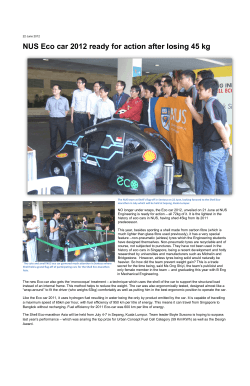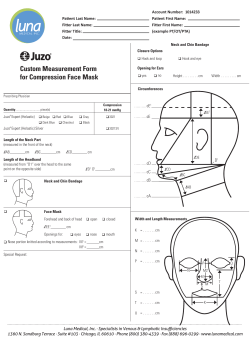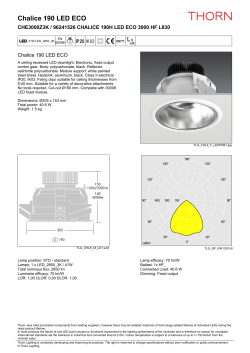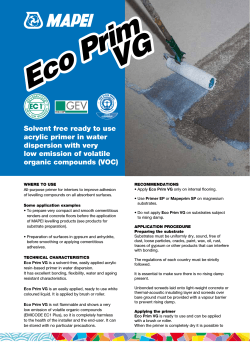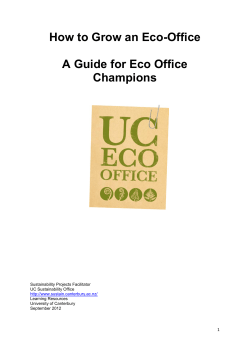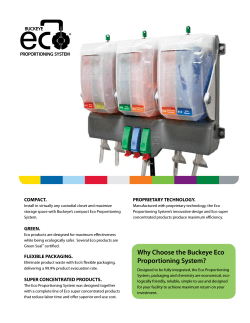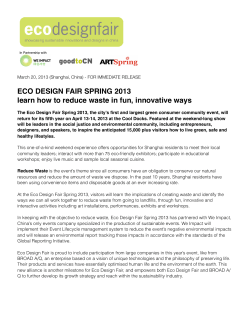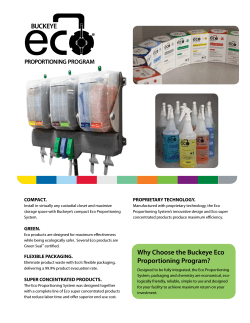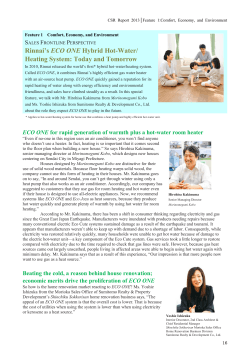
T JEJU RANSFORMING INTO MODEL ECO TOWN
1 TRANSFORMING JEJU INTO MODEL ECO TOWN An introductory presentation in Jeju Province of Republic of Korea 21 May 2013 by Mushtaq Ahmed MEMON, Programme Officer International Environmental Technology Centre (IETC) Division of Technology, Industry and Economics (DTIE) United Nations Environment Programme (UNEP) 2 TRANSFORMING JEJU INTO AN ECO TOWN Source: http://accms-wgm3.kist.re.kr/images/jeju-map-detail.jpg 3 OVERVIEW • International Environmental Technology Centre (IETC) • Brief history of IETC • Eco town concept • Eco town focusing on waste management • Example of Hammerbay Sjostad, Sweden • Why JEJU as model eco town? • Next steps 4 INTERNATIONAL ENVIRONMENTAL TECHNOLOGY CENTRE • The International Environmental Technology Centre (IETC) is a branch of the Division of Technology, Industry, and Economics (DTIE) and is leading the waste management portfolio within UNEP. • UNEP IETC focuses on identifying and showcasing environmentally sound technologies (ESTs) and management practices, primarily in relation to waste. • UNEP IETC is located in Osaka, Japan. 5 BRIEF HISTORY OF IETC • • 1991 – UNEP Governing Council makes a decision to create a UNEP Centre in Japan (GC8 Decision 16/34 on 31 May). 1992 – UNEP and the Government of Japan sign a Letter of Agreement on 30 October; inauguration of IETC. 1994 – IETC starts its operations in Osaka and Shiga. Funding sources include trust fund from the Government of Japan, UNEP environment fund, earmarked contributions, and others. 2011 – IETC is merged into one in its Osaka office on 1 April. • 2012 – 20th anniversary of IETC. • • • 6 IETC CURRENT AREAS OF WORK • • • • • • • • • • Global Partnership on Waste Management (GPWM) Integrated solid waste management (ISWM) Converting waste agricultural biomass into a resource Converting waste plastics into fuel Waste electrical and electronic equipment (WEEE) Destruction technologies for hazardous wastes: health care waste, waste oils and used tires National solid waste management strategies Waste and climate change Industrial waste Natural and cultural management of the Iraqi Marshlands 7 ECO TOWN CONCEPT – CLOSING THE LOOP Hammerbay Sjostad, Stockholm - Sweden 8 ECO TOWN – SOME FOCAL AREAS • Waste – reduce, reuse and recycle • Water – augment, conserve, reuse and recycle • Energy – augment and conserve • Transportation – efficient and smart • Tourism – eco friendly 9 ECO TOWN CONCEPT – WASTE MANAGEMENT Waste Minimization and Reuse Strategies (Awareness and education, policies, technologies, financing and voluntary) Waste Generation Industrial Municipal Agricultural Debris Wastewater / sludge Others Waste Recycling (Material/Energy) Industrial Commercial Agricultural Residential Others Waste Recycling Strategies (Awareness and education, policies, technologies, financing and voluntary) 10 WHY WASTE? Current global MSW generation levels are approximately 1.3 billion tonnes per year, and are expected to increase to approximately 2.2 billion tonnes per year by 2025. This represents a significant increase in per capita waste generation rates, from 1.2 to 1.42 kg per person per day in the next fifteen years. Source: The World Bank Report 2012 – What a Waste: A global review of solid waste management 11 WASTE GENERATION PROJECTIONS Source: The World Bank Report 2012 – What a Waste: A global review of solid waste management 12 WASTE COMPOSITION Source: The World Bank Report 2012 – What a Waste: A global review of solid waste management 13 WASTE STREAMS New waste streams such as electronic waste, waste agricultural biomass, healthcare waste and hazardous waste 14 TURNING CHALLENGES INTO OPPORTUNITIES Challenges Opportunities Composition of the waste Recycling of materials and recovery of energy Growing amounts of waste Employment opportunities Health and environmental hazards Climate change mitigation 15 SHIFT IN WASTE MANAGEMENT 20th CENTURY 21st CENTURY WASTE MANAGEMENT RESOURCE MANAGEMENT “How do we get rid of our waste efficiently with minimum damage to public health and the environment?” “How do we handle our discarded resources in ways which do not deprive future generations of some, if not all, of their value?” Source: Dr. Paul Connett, Zero Waste, Power Point 16 INTEGRATED SOLID WASTE MANAGEMENT (ISWM) BASED ON 3R (REDUCE, REUSE AND RECYCLE) • • • • • Training materials and guidelines Development of ISWM plans for municipalities in Asia-Pacific, Asia, and Latin America Regional trainings Dissemination of information Results: Local capacity built to characterize waste, analyze waste management system, and develop and implement an ISWM plan. 17 ECO TOWN FOR ISWM BASED ON 3R Hazardous Waste for Treatment & Disposal 3R Residential Methane & heat 3R Industrial & Commercial 3R Services (Healthcare, Laboratory, etc.) Energy Treatment Recovery Final waste Collection of Waste Segregation of Waste Recycling waste (organic & inorganic) Waste Exchange Discarded waste Sanitary Landfill, Incineration Final disposal Resources Plastics, wood, steel, paper, glass, and compost/biogas 18 IMPLEMENTATION OF ECO TOWN CONCEPT Baseline Reports (Waste quantity and composition with projections and Current waste management System) Industrial, Municipal, Agricultural, Debris, Wastewater / sludge, and others Target Setting (Reduce, reuse and recycle) Stakeholders Concerns (Economic, social, technical and environmental) Strategies for Eco Towns (Awareness and education, policies, technologies, financing and voluntary) Demonstration of strategies (Awareness and education, policies, technologies, financing and voluntary) Dissemination of eco town activities (Guidelines, project reports and lessons learned) 19 CROSS LINKAGES FOR WASTE MANAGEMENT WATER augmentation (Wastewater reuse and recycling – rainwater harvesting) ENERGY augmentation (Waste to energy through biological and thermal treatment of waste) Resource Augmentation by utilizing WASTE (Industrial, Municipal, Agricultural, and other waste streams) TRANSPORT efficiency and smartness (collection and transportation of waste) TOURISM – eco friendly (tourism related waste generation and management) Please think in the context of JEJU – Any ideas? 20 EXAMPLE – HAMMERBAY SJOSTAD, SWEDEN 21 ECO TOWN CONCEPT – CLOSING THE LOOP Hammerbay Sjostad, Stockholm - Sweden 22 DETAILS • Focus on water • Transforming a rundown industrial dockland into a modern city district • This is a natural extension of Stockholm’s city center with modern design • Environmental friendly life style • When fully developed, there will be 8,000 apartments for 20,000 residents and a total of 30,000 people will live and work within that area 23 DETAILS - 2 • The natural cycle should be closed at as local a level as possible. • Consumption of natural resources should be kept to a minimum. • Total energy consumption should be reduced and energy utilization increased. • Consumption of clean water should be reduced. • Sewage is to be utilized for energy extraction, and its nutrient salt content returned to farm soil. • Building materials are to be renewable or recyclable, and should contain a minimal level of substances detrimental to the environment and public health. • All land in the area is to be decontaminated to such an extent that residents are not put at risk. • The lake is to be restored. • Transport needs are to be reduced. 24 DETAILS - 3 • All solutions are to be adapted to the needs of local residents, and should promote a feeling of community as well as the adoption of ecological responsibility. • The participation and requirements of the residents should be taken into consideration and allowed to influence the design and development of the district itself. • Implementation is to be used as a lever for the development of new sustainable solutions for energy consumption, the consumption of natural resources, sealing the natural cycle, e.g., in the case of food, the recycling/reclamation of waste, the minimization of transport needs, etc. • The solutions and measures used are not to result in increased costs that are so high as to inhibit widespread diffusion of the ideas and principles involved. • The knowledge, experience and technology generated in the process are to be disseminated in such a way as to contribute towards sustainable development in other areas. 25 WHY TO THINK ABOUT JEJU AS ECO TOWN? • Strengths: island with world heritage sites and beautiful ecology and environment • Support: Government, private sector and residents • Advantages: to become model eco town in the world leading to more tourism, ecoservices and eco technologies for waste recycling, alternative energy, water reuse and recycling, smart transport, and so on – bringing more business and employment opportunities and reputation 26 JEJU ON THE WAY TO BE A MODEL ECO TOWN! Designated as UNESCO World Heritage Site Member of UNESCO Global Geoparks Network Designated as the Island of World Peace Venue for leaders to jointly promote peace and prosperity 27 NEXT STEPS! • Based on the request from the government, UNEP IETC may be able to provide technical support JEJU to develop a comprehensive eco town plan and implementation strategy • JEJU government to form a project team and organize training (delivered by UNEP IETC) for them and to undertake the activities leading to develop the plan • Stakeholder participation from inception of plan to implementation and continuous review for improvements 28 International Environmental Technology Centre 2-110 Ryokuchi Koen Tsurumi-ku Osaka 538-0036 Japan tel : +81 (0) 6 6915 4581 fax : +81 (0) 6 6915 0304 e-mail : ietc@unep.org website: http://www.unep.org/ietc
© Copyright 2025
